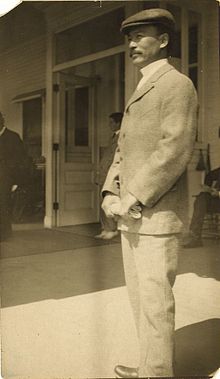Isamu Takeshita
| Isamu Takeshita | |
|---|---|

Commander Isamu Takeshita at Portsmouth, New Hampshire, in 1905. Library of Congress Collection
|
|
| Born | 4 December 1869 Kagoshima, Satsuma domain Japan |
| Died | 1 July 1949 (aged 79) Tokyo, Japan |
| Allegiance | Empire of Japan |
| Service/branch |
|
| Years of service | 1889–1929 |
| Rank | Admiral |
| Battles/wars | Russo-Japanese War, World War I |
| Awards | Order of the Rising Sun (1st class) |
Isamu Takeshita (竹下 勇 Takeshita Isamu?, 4 December 1869 – 1 July 1949) was an admiral in the Imperial Japanese Navy. He was also a diplomat whose accomplishments included helping end the Russo-Japanese War favorably for Japan and obtaining former German possessions in the Pacific for Japan following World War I. In addition, he was a patron and practitioner of the Japanese martial arts, especially judo, sumo, and aikido.
Born Yamamoto Jiro into a samurai class family in Kagoshima, Satsuma domain (present-day Kagoshima prefecture), he was adopted into the Takeshita family as a boy.
Takeshita entered the 15th class of the Imperial Japanese Naval Academy in 1892, and he graduated third in a class of eighty students. He entered naval service as a midshipman in 1889; his first ship was the armored corvette Kongo. In 1898, he attended the Japanese Naval War College, which had been founded that same year.
Because he was fluent in English, Takeshita was posted overseas at various times as a naval attaché. In October 1902, he was appointed Japan's naval attaché to the United States. In this role, Takeshita was an active participant in negotiations mediated by President Theodore Roosevelt that led to the Treaty of Portsmouth, ending the Russo-Japanese War. During 1904, he also helped Roosevelt obtain the services of judo teacher Yamashita Yoshiaki, first for Roosevelt himself and then for the United States Naval Academy. Takeshita's commands included the cruisers Suma, Kasuga, Izumo, Tsukuba and the battleship Shikishima.
...
Wikipedia
